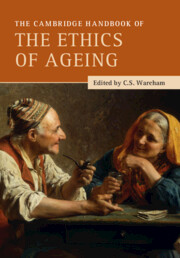Book contents
- The Cambridge Handbook of the Ethics of Ageing
- Cambridge Handbooks in Philosophy
- The Cambridge Handbook of the Ethics of Ageing
- Copyright page
- Contents
- Contributors
- Acknowledgements
- Introduction
- Part I Ageing and the Good Life
- 1 Old Age and the Preference for the Future
- 2 Ageing and the Temporality of the Good Life
- 3 Children’s Prudential Value
- 4 The Ethics of Ageing in Frank Perry’s The Swimmer
- 5 Is Ageing Good?
- 6 Mental Health in Old Age
- 7 In Defense of a Semi-Stoical Attitude about Ageing and Death
- Part II Ageing and Morality
- Part III Ageing and Society
- References
- Index
6 - Mental Health in Old Age
from Part I - Ageing and the Good Life
Published online by Cambridge University Press: 23 August 2022
- The Cambridge Handbook of the Ethics of Ageing
- Cambridge Handbooks in Philosophy
- The Cambridge Handbook of the Ethics of Ageing
- Copyright page
- Contents
- Contributors
- Acknowledgements
- Introduction
- Part I Ageing and the Good Life
- 1 Old Age and the Preference for the Future
- 2 Ageing and the Temporality of the Good Life
- 3 Children’s Prudential Value
- 4 The Ethics of Ageing in Frank Perry’s The Swimmer
- 5 Is Ageing Good?
- 6 Mental Health in Old Age
- 7 In Defense of a Semi-Stoical Attitude about Ageing and Death
- Part II Ageing and Morality
- Part III Ageing and Society
- References
- Index
Summary
What does it mean to be mentally healthy in old age? According to one account, it means to have a mind that is normal, or natural, for an elderly person. According to another, it is to enjoy the same substantive goods that characterize mental health at other ages – so that the mentally healthy ninety-year-old is just like the mentally healthy forty-year-old. Neither approach is plausible. This chapter offers an alternative “resourcist” account, which evaluates mental health in old age by asking what mental resources are most likely to help someone to live well as an elderly person. Living well involves both having good moments and of contributing to a good life story. What it means to be mentally healthy in old age then depends on what opportunities are granted by natural ageing and by social practices for elderly people to expand and conclude the stories of their lives.
Keywords
- Type
- Chapter
- Information
- The Cambridge Handbook of the Ethics of Ageing , pp. 79 - 91Publisher: Cambridge University PressPrint publication year: 2022

